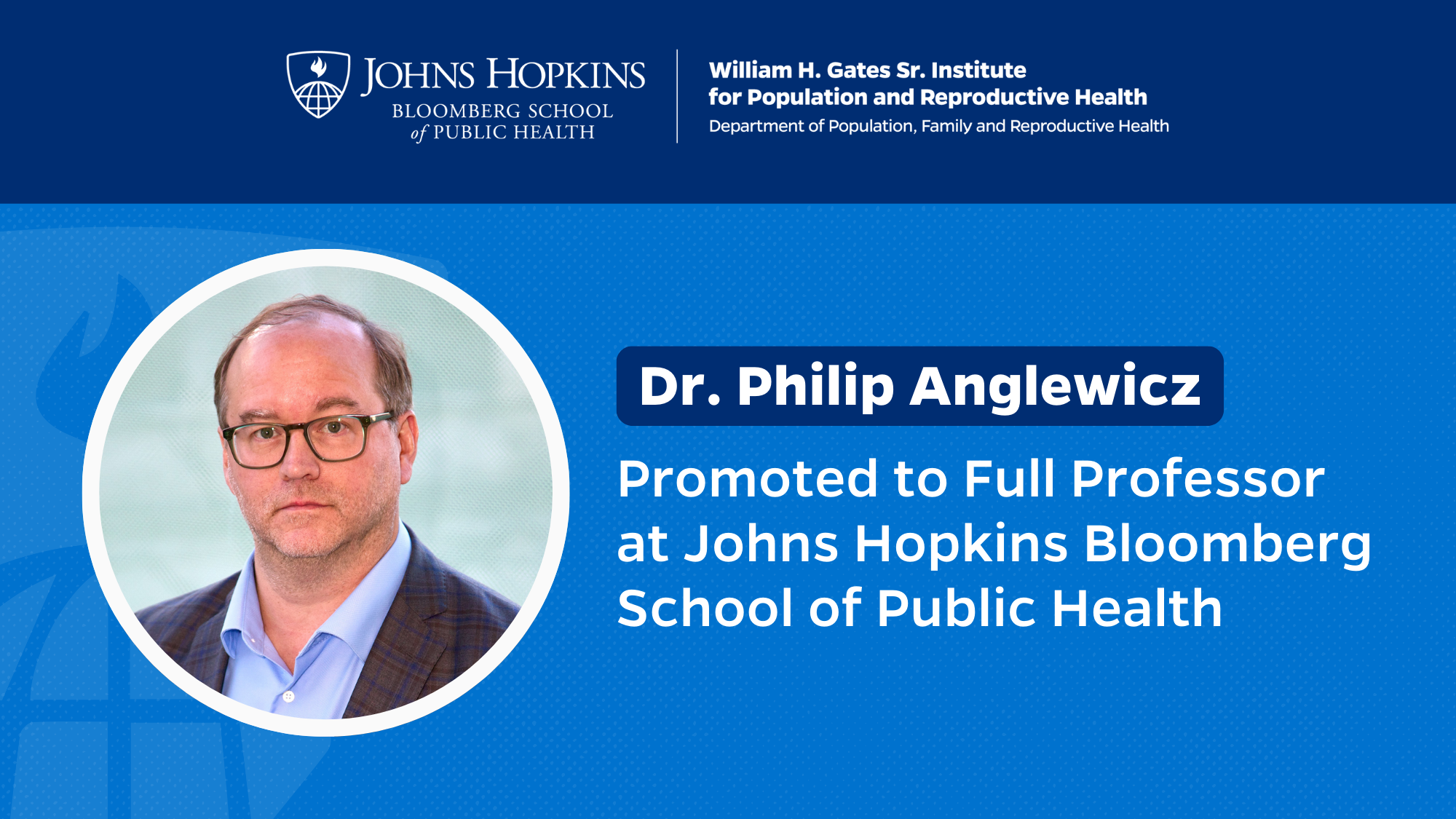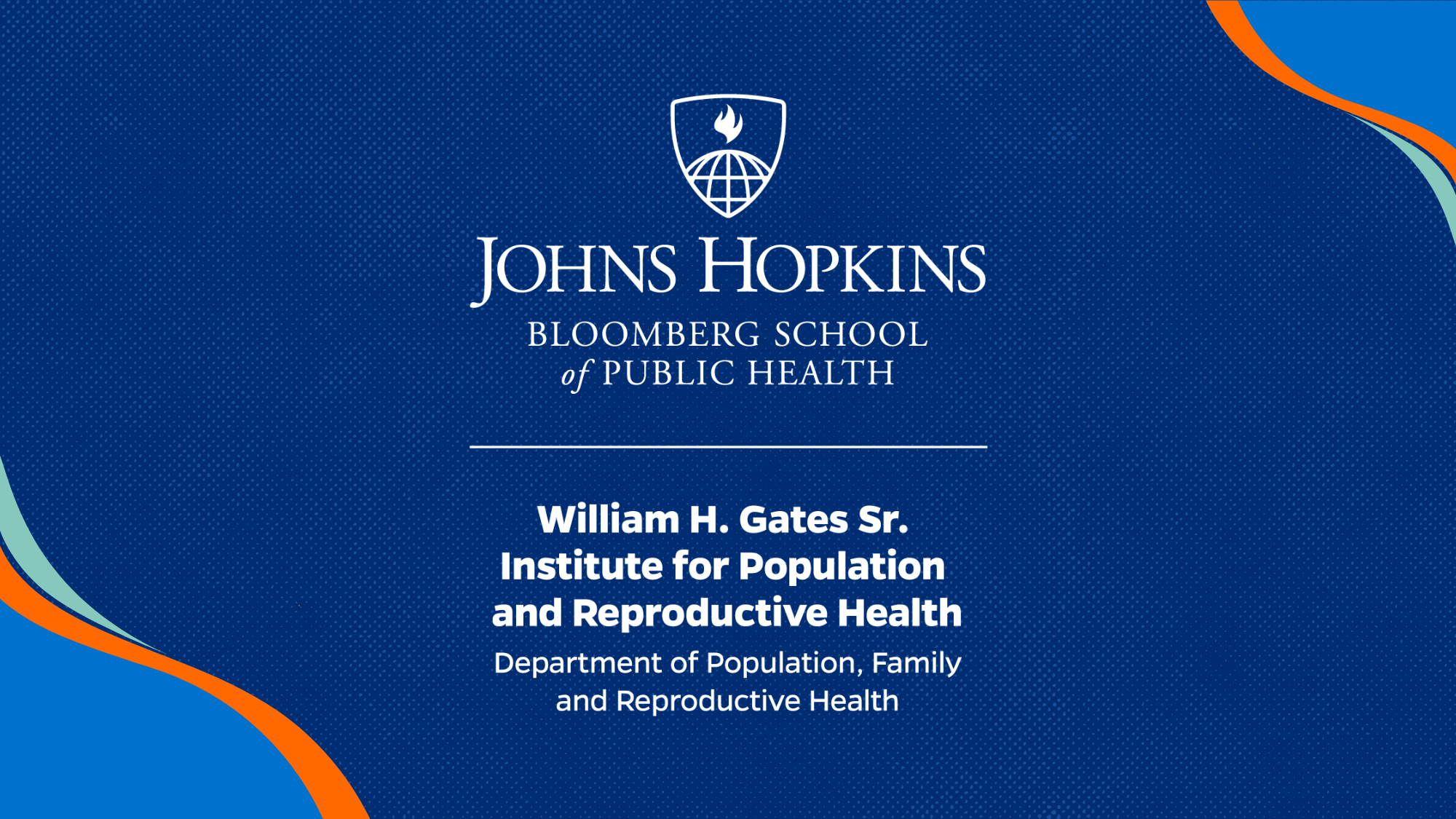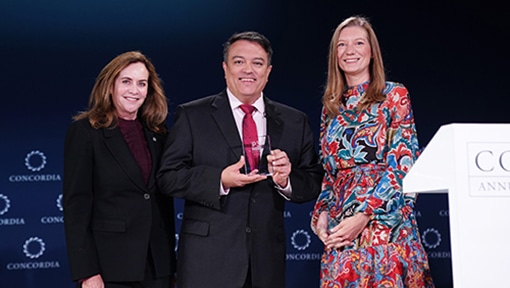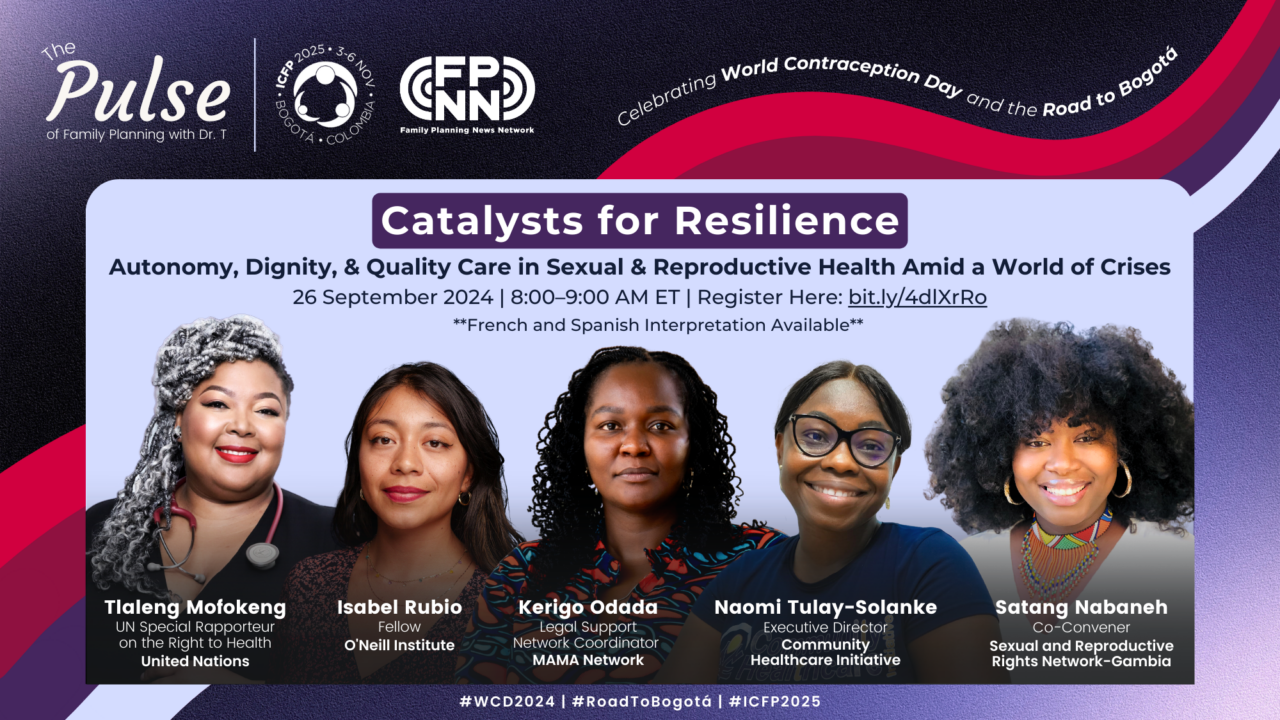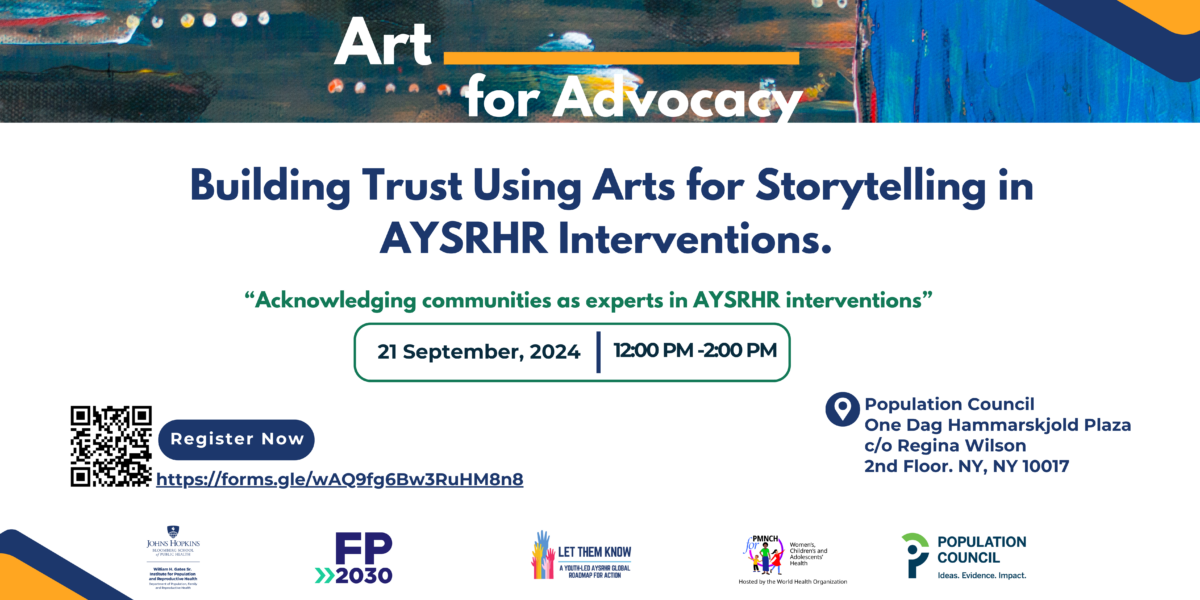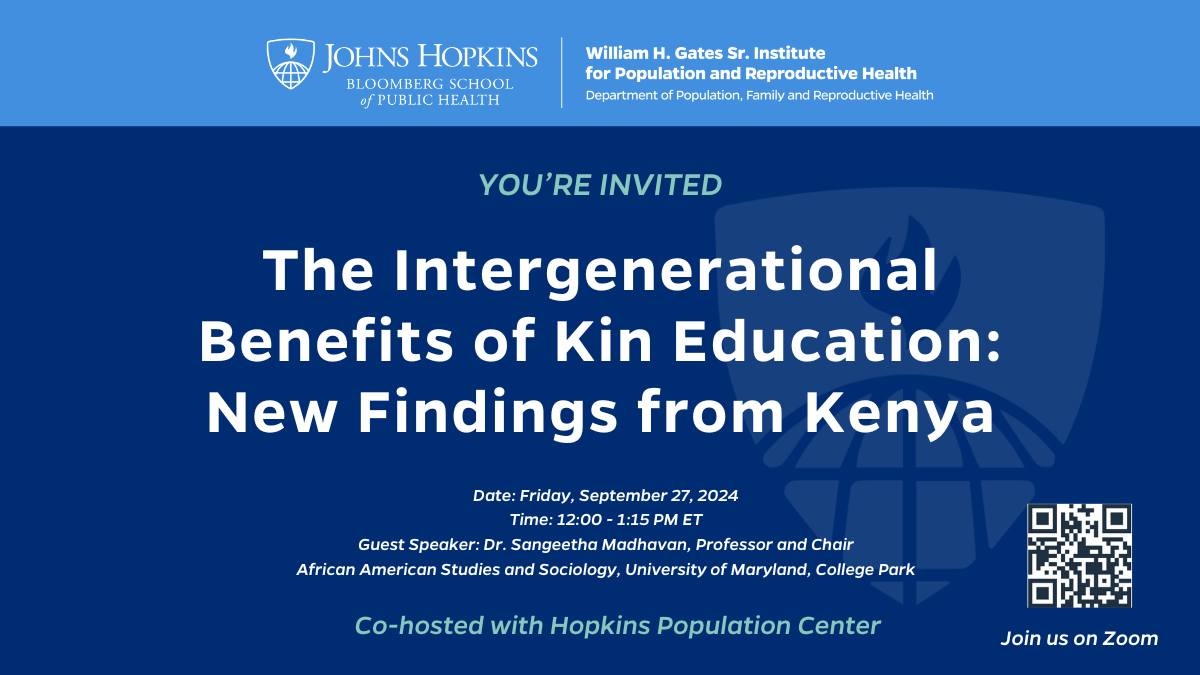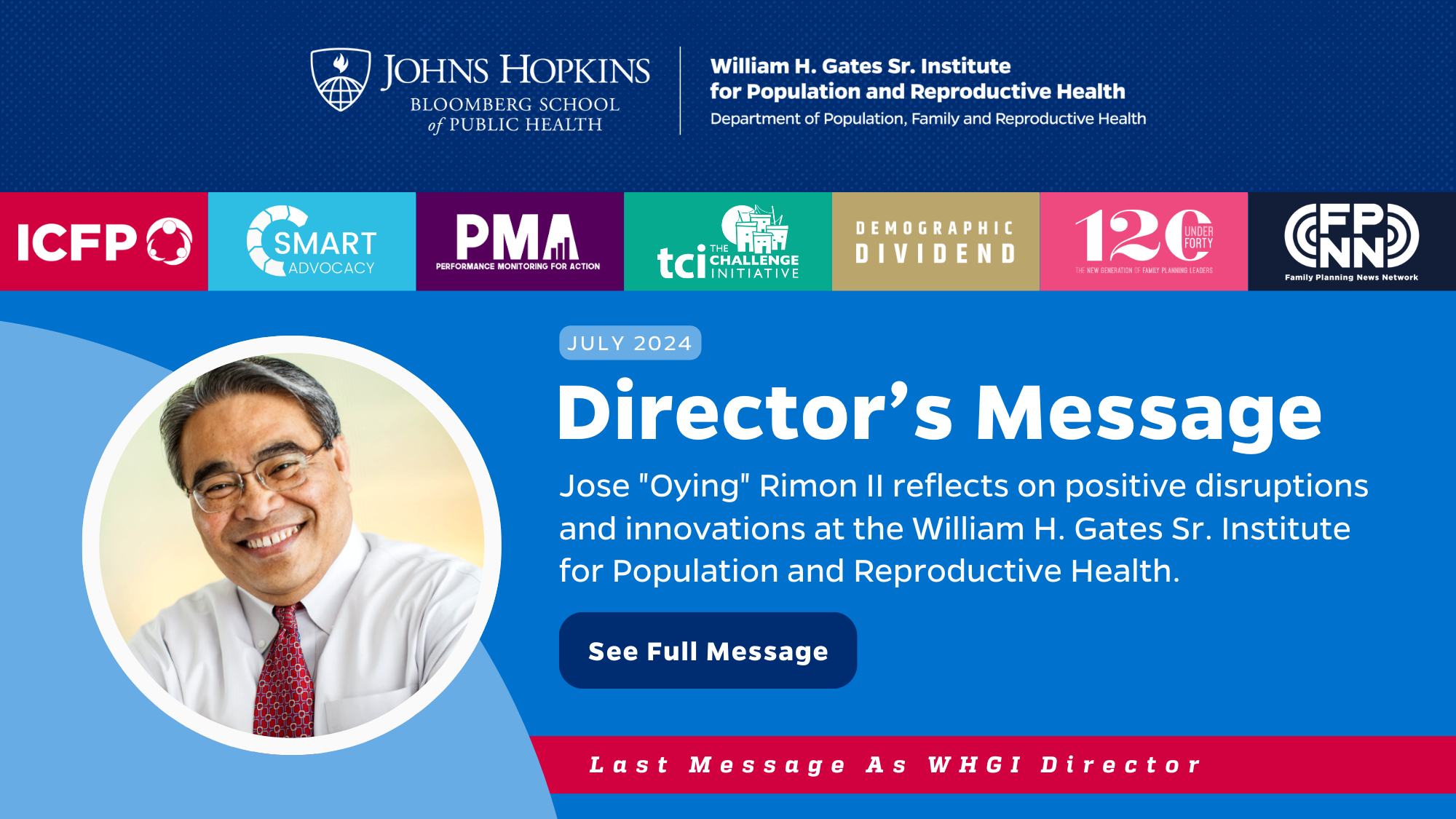
Director’s Message:
Dear Colleagues and Friends,
As I prepare to step down and welcome a new director to the William H. Gates Sr. Institute for Population and Reproductive Health (the Institute), I reflect on our remarkable journey and extraordinary progress together. The past 12 years at the Institute and my entire career in public health and family planning (FP) have been inspiring in light of what we have accomplished, despite assaults against reproductive health (RH) and women’s rights, and considerable headwinds like a once-in-a-generation pandemic. It has also been humbling to see so many outstanding tasks still ahead to bring about a more abundant, equitable, and sustainable world.
From my early days in a small town in the middle of Panay Island, Philippines, through studies at the University of the Philippines, in the UK, and at Princeton, and my tenure at the Commission on Population of the Office of the President in the Philippines, Johns Hopkins Center for Communication Programs, the Gates Foundation, and finally here at the Institute, I’ve been driven by a passion for advancing equity. There is simply no other field for which equity is more critical than family planning and sexual and reproductive health and rights (SRHR), with its well-documented multiplier effects, cost-effectiveness, and transformative impact on families, households, and communities. This journey has been a continuous process of learning and unlearning, disruption and collaboration, innovation and entrepreneurship. It is a journey I would happily repeat if asked to relive my life.
Scholarship and Science for Social Change
When I joined the Institute, I was drawn to its mission of scholarship and science for social change, which sprung from the vision of William H. Gates Sr. (affectionately referred to as Bill Sr.), who was central to the Institute’s formation, seeing the critical need to reinvigorate the field of family planning and bring it to the forefront once again after over a decade of absence from the global agenda. At the Institute’s 15th anniversary, he remarked,
“Since its inception, the Gates Institute’s motto has been ‘scholarship and science for social change.’ It teaches us that social change will not happen with good intentions alone. It depends on smart, determined people asking tough questions and using scholarship and science to answer them.”
Coupled with the Johns Hopkins Bloomberg School of Public Health‘s (BSPH) mission of protecting health and saving lives millions at a time, I consider myself lucky and privileged to have worked for 35 cumulative years at one of the world’s premier schools of public health to advance equity and positively impact lives through the power of public health.
Building a Global Network of Scholars and Leaders
Over the years, the Institute has trained thousands of scholars and leaders from over 60 countries in their own local settings, at conferences and events, and on the Johns Hopkins campus, fostering a global network committed to delivering groundbreaking research, programs, and advocacy. Currently, the Institute works with over 200 partner organizations, of which 90% are based in the Global South.
Reflecting on the Institute’s accomplishments as I hand over the directorship to the next generation, our team is most proud of several achievements. In its beginnings, the Institute helped establish ten Reproductive Health Centers of Excellence (RHCE) in seven countries across the Global South, three of which have transformed into full-fledged schools of public health. At a time when family planning had fallen off of the global agenda, these institutions, together with the Gates Institute, prepared the reproductive health and rights field with the expertise necessary to lead high-quality research, implement innovative programs, and successfully advocate for policy change. They came together to share this information with each other and the world through the first International Conference on Family Planning (ICFP) in 2009, the London Summit on Family Planning in 2012, and the FP2020 movement to allow the larger community to chart a bold course forward.
Today, the Institute and its partners have published over 500 scientific articles that have advanced learning and knowledge about reproductive health and rights, family planning, population issues, and related fields. These helped push the community closer to its collective goals.
Transformative Advocacy and Policy Changes
Through Advance Family Planning (AFP), thousands were trained in SMART Advocacy, and many organizations across the globe were capacitated to engage in effective advocacy efforts. These organizations recorded 3,454 advocacy achievements that resulted in 935 reproductive health policy changes at the subnational, national, and global/regional levels. From 2009 to 2013, AFP mobilized over US $185 million in funding for family planning across Africa, Asia, and Latin America. The tools developed by AFP are free for all to access in multiple languages, ensuring that they are a global public good at SMARTAdvocacy.org.
Revolutionizing Data Collection
Through the Performance Monitoring for Action (PMA) platform, the Institute revolutionized data collection by empowering local women resident enumerators to use mobile technology to rapidly collect high-quality data, filling a critical gap in Demographic and Health Surveys (DHS) by producing representative estimates on an annual basis, with which to make programmatic decisions. PMA has modules not only on family planning but also water and sanitation, nutrition, abortion, primary health care, women’s empowerment, maternal, newborn, and child health, COVID-19, and menstruation and has been eagerly utilized by donors and countries to evaluate their programs in near-real time. PMA also developed close ties with in-country policies and programs and documented numerous examples of how PMA data were used to influence FP/RH policies directly.
We are now embarking on research and programs that document how gender equity influences gateway behaviors in many other facets of health and economic well-being and are in the process of applying artificial intelligence (AI) analytics on a host of public health data to detect patterns that would allow us to solve intractable problems.
Empowering Youth and the Next Generation of Leaders
Believing that any movement can better inspire and flourish with the inclusion of young people’s passion, creativity, and leadership, the Institute has invested in identifying, recognizing, supporting, and meaningfully engaging youth across the globe who embody these qualities in their drive to realize reproductive health and rights for all.
We will continue to invest in preparing the next generation to lead this work now and into the future—through initiatives including the 120 Under 40: New Generation of Family Planning Leaders, ICFP Youth Trailblazer Awards, Global Health Leadership and Advocacy Accelerator training program, significant participation of youth in the most prominent scientific platform and conference in reproductive health and rights (ICFP), the youth-led and youth-created Global Roadmap for Action (GRA) on adolescent and youth sexual reproductive health and rights (AYSRHR), scholarships, fellowships, and grant funding to build young leaders’ capacity and help them execute innovative ideas.
Fostering a Collaborative and Impactful Community
Our work has always been about more than just research. It has been about fostering an exchange of ideas, forging impactful coalitions and partnerships, supporting policymakers, program implementers, and civil society, and creating new champions. Toward this end, the Institute hosts what has grown into the most significant scientific conference and platform for the movement (ICFP), which is truly owned by the community with members representing more than 100 organizations on its Core Organizing Group, National and International Steering Committees, and 11 global, intergenerational subcommittees focused on various topics of significance.
Since its inception in Kampala, Uganda, in 2009, ICFP has become a pivotal platform for sharing research and best practices, fostering partnerships, building capacity in scientific writing, and catalyzing advocacy efforts to drive policy change. The creation and continued reimagination of ICFP have deep ties to the Institute’s mission of cultivating new ways of thinking and doing to accelerate locally led progress in gender equity, sexual and reproductive health and rights, population dynamics, and equitable development.
Modernizing SRHR Media Engagement
In search of a transformative and practical approach to supporting media to more widely cover family planning and SRHR, the Institute developed a platform approach to digital news, content creation, and community partnerships, known as the Family Planning News Network (FPNN). FPNN comprises an engaged, informed, and connected network of journalists, influencers, technical experts, community reporters, and content creators committed to reporting and amplifying the information and wins that the collective SRHR community wants to advance. Founded in the lead-up to ICFP 2022 in Pattaya City, Thailand, FPNN is the world’s first community-owned sexual and reproductive health media network, demonstrating that community-owned content is critical to making positive disruptions globally.
A Business Unusual Approach
Positive disruptions are a hallmark of the way we work. One of the most fascinating challenges the Institute has risen to is the call to disrupt the way our community does business. The Challenge Initiative (TCI), situated inside the poorest, most neglected city sectors, gave us and our partners the space to apply “business unusual” thinking to demonstrate that rapid scale-up can be achieved with considerable impact, cost efficiencies, and cost-effectiveness and that these can be sustained beyond the life of these projects. The “business unusual” tenets include a demand-driven design in which cities and local governments apply to become part of the Initiative and bring their own funding and other resources to the table.
As well, TCI University was launched, through which high-impact practices (HIPs) are documented, codified, simplified, and made portable for easy adaptation, and master coaches from the local hub community are identified and trained (many from the ranks of local governments) to coach local leaders and personnel on technical as well as managerial and governance issues. TCI uses the Health Management Information System (HMIS) to track real-time and near-time impact data to measure progress and help guide local decision-making; tools to monitor changes in health systems capacities in real-time; and a mechanism to continue to monitor data and the implementation of high-impact practices long after the cities have graduated from TCI direct assistance and moved into a fully sustainable, self-reliant ownership of the program.
In eight years, TCI has engaged more than 300 cities and local governments in 13 countries, covering a population footprint of 250 million. Over half of these cities have graduated from TCI assistance and have collectively effectuated 4.5 million additional users of modern contraceptives, certified thousands of master coaches, generated more than $66M of cash allocations by cities to implement the programs and tracked post-graduation progress that shows approximately 50% of graduated cities continue performing at the same level or better.
Harnessing the Demographic Dividend
Lastly, the Demographic Dividend (DD) initiative is a cornerstone of the Institute’s efforts that integrates research, advocacy, and policy frameworks to unlock countries’ potential for accelerated economic growth through investments in youth, gender equity, and reproductive health to achieve the Sustainable Development Goals (SDGs). The Institute played a seminal role in reviving the DD framework to illustrate the economic impacts of fertility changes by co-hosting side events around the World Bank’s annual meeting in 2011 and at the meeting of African finance and economic ministers hosted by the African Union and the Economic Commission for Africa, the latter of which resulted in the ministers calling for the launch of a DD initiative for all of Africa.
The Institute also hosts the DD website on behalf of the community, where one can find innovative tools, such as the Demographic Dividend Effort Index (DDEI) in eight countries that guide policymakers, researchers, advocates, and service providers in assessing local policy environments, and the soon-to-be-launched Demographic Dividend Impact Calculator (DDIC) that the Institute has developed with the creators of the DD framework to equip local governments with the ability to calculate the impact of demographic dividend policies on their country’s economic growth.
A Bold Vision for the Future
Looking ahead, the Institute remains committed to a bold, multi-dimensional agenda that builds upon our scientific expertise, strong partnerships, and collaboration with our passionate, ever-growing community.
We now find ourselves at a time where our community’s hard-won victories over the last several decades are being assaulted by well-funded, hostile forces who want to bring us back to the dark ages. In this world, reproductive health and rights, women’s rights, and the environment in which we live are in peril.
We will not allow that to happen.
The Institute has crafted six interconnected global programs to advance our field and stand firm against these hostile forces through 2030 and beyond. In my view, if we can execute these priorities, we will be able to achieve my dream— the dream of many of us—the unification of reproductive health and rights, women’s rights, and climate change movements into a cohesive force the world has not yet seen. Even in my retirement, I commit to contributing to making this dream—this necessity—a reality. To paraphrase Mark Twain, the work that one believes in and enjoys doing is play and not work at all. Therefore, my retirement will be a continuation of the many fulfilling aspects of this work—this play—that I so deeply enjoy.
I am immensely grateful for the opportunity to have led such a transformative organization. The future of the William H. Gates Sr. Institute for Population and Reproductive Health is now passed on to new leadership, who will move the field forward with some of the best, most talented staff and partners with whom I have ever had the pleasure of working. I am confident that, with its keen focus on excellence, equity, and interdependence, the Institute will continue to drive its mission forward with passion and dedication to help realize our community’s collective goal of reproductive health and rights for all.
Thank you all for your thought partnership and commitment to equitably improving lives through all that we have accomplished together over the years.
With warm regards and deepest gratitude,
Jose “Oying” Rimon II

